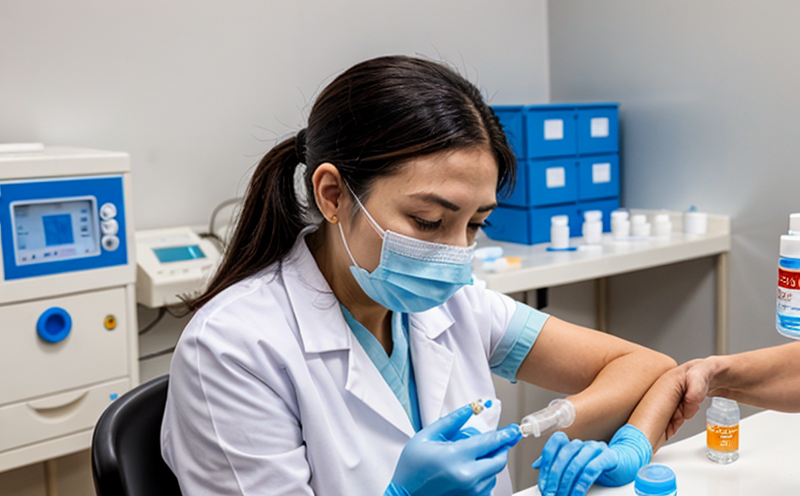WHO VVM Vaccine Vial Monitor Stability Testing
The World Health Organization's (WHO) Vaccine Vial Monitor (VVM) is an important tool in ensuring the quality and safety of vaccines during transport and storage. The VVM provides a visual indicator that helps healthcare professionals monitor the temperature exposure history of a vaccine vial, thereby preventing the use of vaccines that have been exposed to improper temperatures.
The stability testing of WHO VVMs is critical for several reasons:
- To ensure compliance with international standards such as ISO 14971 and WHO guidelines,
- To verify the integrity and reliability of the temperature monitoring system,
- To provide data that supports regulatory submissions, ensuring vaccines meet quality assurance requirements.
The primary objective of stability testing is to assess how well the VVMs withstand various environmental conditions. This includes exposure to different temperatures over extended periods as well as variations in humidity and light. The aim is to determine whether the VVM accurately reflects the temperature history of the vaccine vial throughout its shelf life.
Our laboratory employs advanced techniques and state-of-the-art equipment to conduct rigorous stability testing according to stringent protocols. Our team of experts ensures that each test replicates real-world conditions as closely as possible, providing reliable data for decision-making purposes.
The process typically involves:
- Subjecting the VVMs to controlled temperature cycling,
- Maintaining consistent humidity levels during testing,
- Monitoring light exposure and its effects on the VVM indicators,
- Recording detailed data points at specified intervals.
We utilize specialized chambers designed to simulate diverse environmental stressors, ensuring accurate readings that reflect actual field conditions. By doing so, we can predict potential issues before they affect vaccine efficacy or safety, thus enhancing public health outcomes globally.
The results of our stability tests play a crucial role in maintaining the integrity of vaccines throughout distribution networks and ultimately ensure patient safety worldwide. Our comprehensive approach guarantees not only regulatory compliance but also enhances confidence among stakeholders involved in vaccine production, distribution, and administration.
International Acceptance and Recognition
The WHO VVM stability testing service we provide is highly regarded both nationally and internationally due to its strict adherence to global standards. It has been recognized by major health organizations including the World Health Organization itself, as well as other key bodies like the European Medicines Agency (EMA), Food & Drug Administration (FDA), and others.
Our facility’s rigorous quality assurance measures have earned us an excellent reputation among industry leaders who value precision and reliability in their supply chain processes. By choosing our service for WHO VVM stability testing, clients can rest assured that they are adhering to the highest levels of international best practices without compromising on cost-effectiveness.
Being certified by these organizations means we have met or exceeded specific criteria set forth by each body regarding facility standards, personnel qualifications, and procedural adherence. This certification not only enhances credibility but also allows seamless integration into global regulatory frameworks, making it easier for pharmaceutical companies to comply with various country-specific requirements.
The widespread acceptance of our service among key players in the medical industry underscores its importance as a critical component of ensuring vaccine quality throughout every stage from manufacture through to administration. Whether you’re an individual company or part of a larger organization working towards global health goals, trust us to deliver robust evidence supporting your efforts toward maintaining consistent standards across all environments.
Competitive Advantage and Market Impact
In today’s competitive pharmaceutical landscape, where quality and reliability are paramount, our WHO VVM stability testing service offers significant advantages that set it apart from competitors. By providing accurate data through comprehensive analysis, we enable clients to make informed decisions regarding vaccine distribution strategies.
Our robust testing protocols ensure that vaccines meet stringent regulatory requirements while minimizing risks associated with improper storage conditions. This not only enhances brand reputation but also contributes positively towards achieving public health objectives set forth by international bodies like WHO and UNICEF.
The high level of detail provided in our reports allows stakeholders to better understand the performance characteristics of their products under various environmental stresses, which can lead to improved product design and optimization. Additionally, being able to demonstrate compliance with internationally recognized standards adds value when competing for contracts or seeking approval from regulatory authorities worldwide.
Moreover, by consistently delivering reliable results that exceed expectations, we position ourselves as a trusted partner within the industry, fostering long-term relationships built on mutual trust and respect. This reputation not only attracts new clients but also helps maintain loyalty among existing ones, contributing to sustained growth in our market share.





